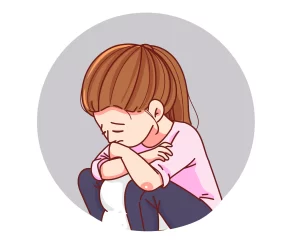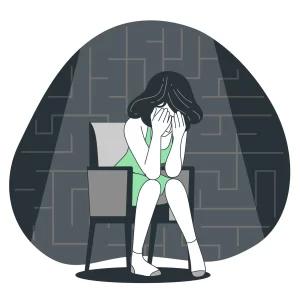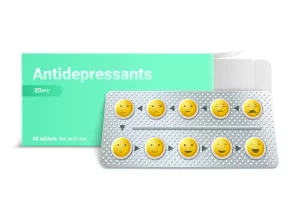Difference Between Anxiety and Depression – Primary Care of Kansas
The Difference Between Anxiety and Depression has been a topic of interest for researchers and medical professionals.
There’s a complicated relationship between the two.
Both conditions can sometimes coexist, which makes differentiation difficult.
This blog post explores the correlation between these two mental health conditions, their coexisting signs, and how to treat the dual diagnosis.
What is Anxiety?

Anxiety is constant worry or fear, even when nothing’s wrong. Many people might experience some anxiety occasionally.
When anxiety becomes persistent, it turns into an anxiety disorder.
The following types of anxiety disorders:
- Generalized anxiety disorder.
- Social anxiety disorder.
- Panic disorder.
- Specific phobias.
What is Depression?

Depression is a severe condition that causes persistent sadness, hopelessness, and a lack of desire to go about everyday life.
People with depression often experience anxiety, possibly even panic attacks.
Like anxiety, depression also has different types.
- Major depressive disorder.
- Persistent depressive disorder.
- Bipolar disorder.
- Seasonal affective disorder.
- Psychotic depression.
- Postpartum depression.
- Atypical depression.
- Situational depression.
- Premenstrual dysphoric disorder.
Signs of Coexisting Anxiety and Depression
Anxiety and depression coexist in the following ways:
- Deep sadness, as well as fear for the future.
- Fatigue, muscle tension, rapid heartbeat, and digestive issues can be symptoms.
- Sleep disturbances and fluctuating appetites can cause weight changes.
- Mood swings and irritation.
- Incapable of relaxing and living in the moment.
- Social isolation due to social apprehension and disinterest.
- An overwhelming sense of worthlessness and negative self-talk.
- Having trouble concentrating, making decisions, and remembering things.
- Avoiding anxiety-inducing situations and giving up something you enjoy.
- Suffering from panic attacks and feeling out of control.
- Suicidal thoughts and/or self-harm in extreme conditions.
If you or someone you know shows these signs, seeking professional help is extremely important.
Why Do Anxiety and Depression Often Co-occur?
The cycle of negative thoughts and feelings often accompanies anxiety and depression.
There are several reasons why they can often occur together.
- Anxiety can lead to depression. Pervasive anxiety makes you feel stressed constantly. One of the ways depression can begin is by fearing as if one is losing control of one’s mind.
- High risk together. People with anxiety disorders tend to suffer from depression—nearly half of MDD also experience severe anxiety.
- There can be mutual triggers. Depression and anxiety can trigger each other. For example, anxiety can come first and then lead to depression.
- PTSD connection. PTSD usually results in depression.
- Biological predisposition. It is possible to link anxiety and depression to genetics. Some people inherit a tendency to worry, which makes them more likely to develop these conditions.
People often go through cycles of anxiety and depression.
This cycle of anxiety and depression has episodes of intense anxiety followed by episodes of depression.
How to Tell the Difference Between Anxiety and Depression
- Anxiety is a fear-induced reaction to what might happen in the future. Meanwhile, depression is a state of hopelessness and prolonged sadness.
- Anxiety can cause symptoms like rapid heartbeat or sweating, while depression can lead to a slowed physical reaction.
- A depressed person keeps thinking about the past, while an anxious person fears the future.
- Anxiety mainly involves fear and worry, while depression is marked by sadness and emotional emptiness.
Dual Diagnosis – Treat depression and anxiety naturally
These are some ways to break out of depression and anxiety and get better. Some strategies are:
1. Advanced psychotherapy (Talk Therapy)
- Cognitive-behavioral therapy (CBT) – Can help patients pinpoint and change negative behavior patterns.
- Dynamic interpersonal therapy (IPT) – Helps you strengthen relationships and communicate better.
2. Medication

- Antidepressants – Some antidepressants relieve anxiety and depression.
- Anti-anxiety Medications – Some medications reduce anxiety, like benzodiazepines.
3.Changing Your Habits and Lifestyle
- Exercise – Exercise helps you feel better and positively affects your mental health.
- Your Diet – You can keep a positive mood with a balanced diet. Reduce your sugar and caffeine intake and eat more nutritious foods.
- Your Sleep Habits – Healthy sleep habits can help you feel better and reduce symptoms.
4. Mindfulness
- Meditation – Can help people get into a better headspace.
- Yoga – It can manage symptoms as a physical and mindfulness practice.
5. Self-care
- Try to indulge in things that soothe you.
- Do a digital detox.
- Make time for a good friend or loved one.
- Get outside and breathe in the fresh air.
Seeking Professional Help
The relationship between anxiety and depression is complex and has many aspects.
You can improve mental health by recognizing the signs, understanding how they interact, and getting appropriate help on time.
If you are struggling with anxiety, depression, or both, help is available.
We provide mental health care to anyone experiencing depression or anxiety.
Reach out to us today if you need care and support to recover.
FAQs
Why do I feel sad after a good day?
There are many reasons why this happens. It can be related to changes in mood, a comparison between good and bad days, or even the fear that the good feelings won’t last.
I’ve never had anxiety before; why now?
New-onset anxiety can occur for various reasons, like life changes, stressors, or biological reasons. Life events, like significant changes or trauma, can also trigger anxiety.
Why do anxiety and depression come and go?
You might experience anxiety and depression from time to time due to stress, shifts in life, or chemical imbalances. It’s essential to seek support when they return.
Does anxiety cause exhaustion?
Yes, anxiety can cause physical and mental fatigue. When constantly worried and stressed, you can lose energy, disrupt your sleeping patterns, and feel exhausted.
Can you go to the hospital for anxiety?
You can go to the hospital for anxiety if you have severe symptoms. You can get immediate care and safety in hospitals with the help of mental health professionals.
What are some cognitive changes that accompany depression?
- Being unable to concentrate.
- Memory issues/decline.
- The tendency to think negatively.
Is there a way to find the root of your depression?
Start by self-reflecting, keeping a journal, and noting triggering moments. You can find helpful insight and treatment options by talking to a mental health professional.
Depression comes in waves; what does that mean?
It means that depressive symptoms fluctuate in intensity over time. You feel better sometimes, but sometimes not.
Why am I depressed even though my life is good?
Depression isn’t always linked to external factors. Brain chemical imbalances can cause it as well.
Are there any ways to tell the difference between stress and depression?In most cases, external pressures trigger stress and last for a short period. People with depression feel sad and hopeless and feel an emptiness within. If you’re not sure, speak to a therapist.


No comment